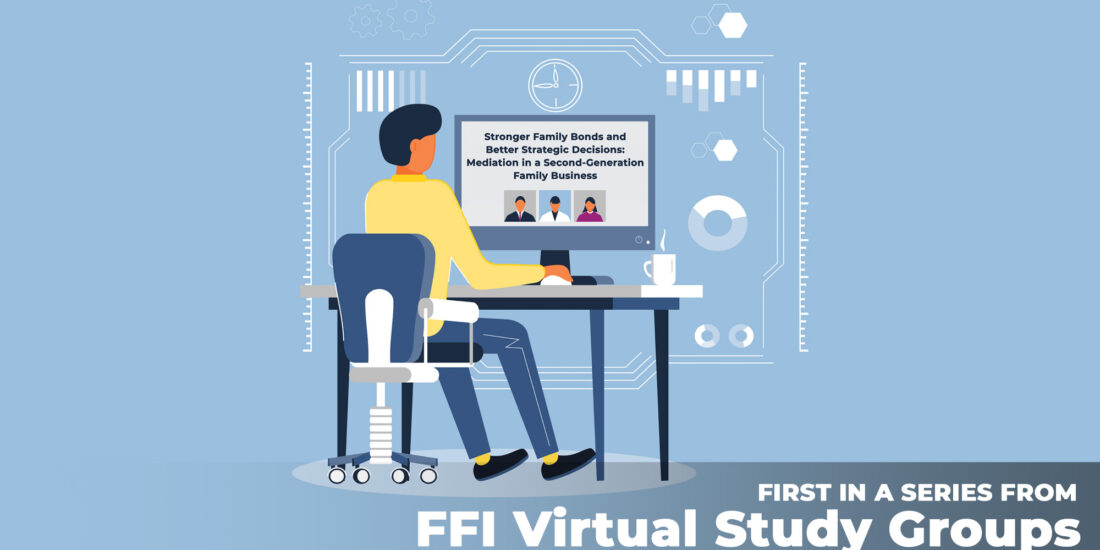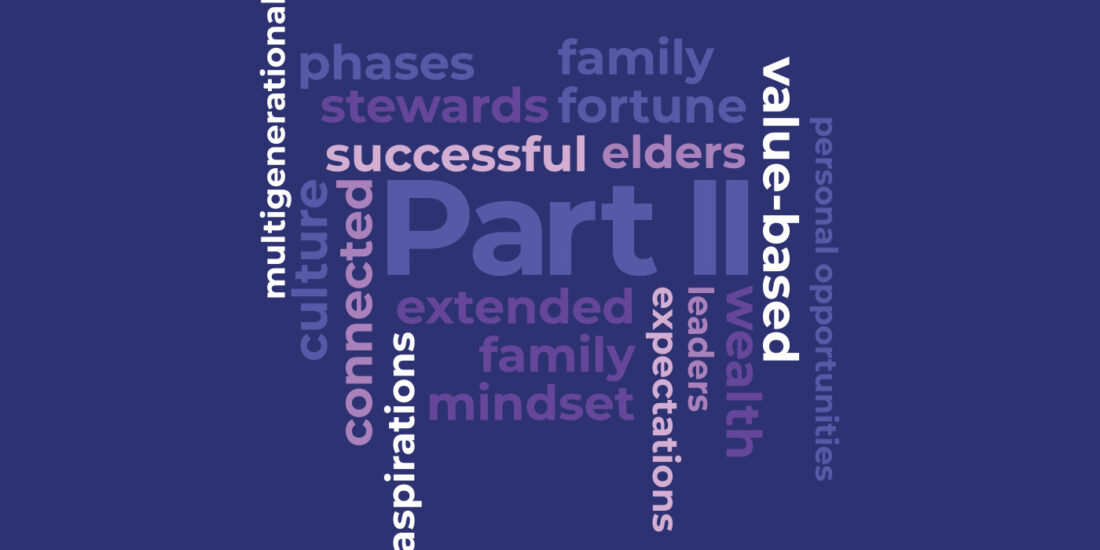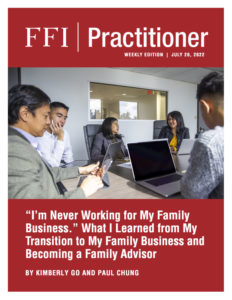
View this edition in our enhanced digital edition format with supporting visual insight and information.
In this week’s FFI Practitioner, members of FFI’s Asian Circle Virtual Study Group, Kimberly Go and FFI Fellow Paul Chung, explore the complex choices facing next gen family members about whether to join the family business and the role of family business advisors in helping the family navigate these decisions. In the article, Kimberly shares her experience joining her family business and then deciding to transition to a career as a family business advisor.
“I’m never working for the family,” I thought when I left for university in America, having no intention of returning home.
Growing Up in a Filipino-Chinese Family in the Philippines
I was born and raised in Manila, Philippines, to a Filipino-Chinese family. I lived in a three-generation household with my paternal grandparents, and I am the eldest daughter and the middle child. Growing up, my elders were protective and strict. I could not go on play dates as a child or stay out past midnight throughout high school, and when I wanted to go outside, my grandparents would tell me it was not safe. My siblings and I were instilled with values around obedience and respect. We were taught to pour tea for others and carry bags for our elders, who often told us, “You have to be obedient,” “You have to know how to think,” “You have to listen.”
My family placed heavy emphasis on business, and my father would teach us business concepts and encouraged us to build and lead our own ventures. During dinners, my father would teach us how to invest and how to interview employees. But I knew at a young age that, unlike my siblings, I wasn’t motivated by running businesses. I remember telling my father once at dinner, “I don’t want to lead. I just want to write.”
Studying, Working Abroad, and Deciding to Return Home
I loved living and studying abroad. At university I studied journalism and economics under Pulitzer Prize winners, New York Times op-ed writers, and pioneering researchers. I met friends from around the world and had the freedom to explore places that excited me. While overseas I thought about how to stay abroad. I reasoned that the best way to get a job abroad after college was to get as much experience as possible prior to graduation. By the time I graduated I had completed six internships and tried living in four different metropolitan cities besides Manila.
But as graduation neared, my family asked me to return home. My grandmother needed assistance. My mother was fatigued from work and caring for my younger brother. I wanted to help my mother and felt pressured to return. I was afraid of losing the person I had become living abroad and grieved the opportunities I would lose. Still, a part of me felt I had been running away from working for the family, and I could only overcome my fears by returning home.
Concurrently, my experiences abroad showed me that if I worked for a corporation, I would be a subordinate who was easily replaceable. I also knew that if something happened to my elders, I would have to return home. I thought, “The family business is part of our family legacy,” and I decided I should get to know our business, understand it, and see if the work was a good fit for me. I struggled with this decision; I would be the first grandchild to work for the family business, and I would be living with my parents and grandparents again. I didn’t know what life would be like when I returned.
Learning and Bridging the Intergenerational Communication Gap
Before I went home, I asked family members what it was like to work with my grandfather. They shared that he would interrupt and say, “You don’t know anything.” In the first few weeks, I found that what they told me was true. When I gave my opinion or suggested different processes, my grandfather would cut me off, say “No,” or interject with a long anecdote. Sometimes when I asked questions, he called me incompetent. In my frustration I asked myself, “Why does he think that way?”
My grandfather, who was in his early 80s at the time, had never graduated from college. He worked his way up from selling plastic golf clubs and slippers on the street to growing a chain of retail stores and financial service companies. He had faced failed businesses, and through multiple re-starts he gained experience and achieved success. I put myself in his shoes and reflected on his words. I realized that even though I had experience working abroad, I knew very little about the legal landscape, politics, and business culture of the Philippines compared to him. One day I told him, “You have more experience than I do. I am sure what I know is only a fraction of what you know. But I also have different experiences and ideas—I may not know if they will work but I would like to talk to you about them and get your opinion.” He said, “Okay,” and listened with more productive outcomes.
Challenges with Work and Home
After working with my grandfather, I worked under my mother, with whom I had difficulty communicating because of our different work styles. Because I live with my family, there were also no clear work hours. If there was work in the evening, my mom would leave papers by my desk after dinner. My parents also wanted me to succeed my mother’s role as a compliance officer in our business, which I felt pressured to do even though I knew I would not like it. At home, it was difficult to balance the different expectations my elders had for me. I felt I was the family secretary. It made me anxious to feel that I was on-call all the time.
I realized I had to set boundaries. I clarified what I could and could not do. It took time for my family to take me seriously, but I pushed back, politely and respectfully, until they understood. Due to the initial lack of boundaries and role clarification, I had to set my own work hours, limiting them to 8 to 9 hours a day. I also decided that what I did for my family would also be considered work. I managed expectations by telling my parents I did not want to be a compliance officer. They were not thrilled, but I offered to take on a support role, and attention shifted to hiring another compliance head.
My Transition to Becoming a Family Business Advisor
After four years of working for my family’s business, I had learned the importance of preparing for transitional challenges. I did not know what I was getting myself into when I chose to return and faced many obstacles all at once. Joining FFI proved to be a helpful resource, and I learned the important role advisors can play in fostering smooth intergenerational transitions.
Advisors can facilitate discussions around the challenges that a rising-generation member might encounter:
- Recognize the system dynamics in play and drive clearer delineations between work and home. Advisors can help the rising generation reflect on the relationships at home and at work and help them see the different goals and tensions in the constituent systems. To do so, advisors can ask the rising generation the following questions:
- Will you have personal space and free time? How important are these aspects to you?
- Do you need to negotiate a set or flexible work schedule?
- Should work done for the family (outside of corporate responsibilities) be compensated?
- Will your co-workers and managers accept and collaborate with you?
- What happens if your integration into the workplace does not go smoothly, especially if your co-workers are also relatives?
- Facilitate clearer lines of communication and prepare for conflict. Advisors can help family members understand the impact of different communication styles and the conditions necessary for maintaining healthy dialogue, as well as the family histories of successful and failed negotiation. Advisors can be honest with the rising generation about the importance of managing and preparing for conflict. Their knowledge of mechanisms for conflict management can affect how family members perceive their engagement with the business by asking probing questions such as:
- What happens when the business and the family are under stress?
- What processes are available to manage conflict at work and at home?
- Are there mediators or other neutral third parties to handle such matters?
- Does the rising generation know who and where they can go to when conflicts arise?
- Help set career and personal development goals and explore potential overlaps with the goals of the family and business. Advisors can coach the rising generation to reflect on their career and life paths, especially in understanding how they might intersect with the family enterprise system by asking the following questions:
- What are your career aspirations?
- What kind of roles will help you realize these aspirations?
- What are the skills required for these roles, and do you have them?
- What is the training and development required to fulfill your aspirations?
- The concept of fit should also be discussed:
- What are the vision and mission of the family and the business, now and in the future?
- How will your role fit within this bigger picture?
- What key aspects of the family and the business do you need to learn and understand?
- Advisors should prepare the rising generation to participate in succession planning discussions and opportunities, although they ultimately may not be guaranteed. Advisors can also help rising generation members explore career alternatives if they are not interested in continuing in the business or if they are not a good fit.
These areas can help a rising generation member better prepare for entry into the family business. My journey so far has been challenging but rewarding. In the same way that family businesses survive by continuing to evolve, I hope to keep learning and evolving with my business and my family.
About the Contributors
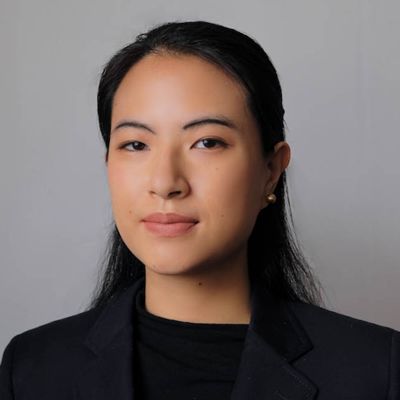
Kimberly Go, CFBA, CFWA, is assistant vice president of her family’s business and a consultant at Premier Family Business Consulting. She is a third-generation member of her family business and graduated from Northwestern University with a double major in journalism and economics. Kimberly is interested in conflict resolution, succession planning, and educating the rising generation. She can be reached at kimberlychristinego@gmail.com.
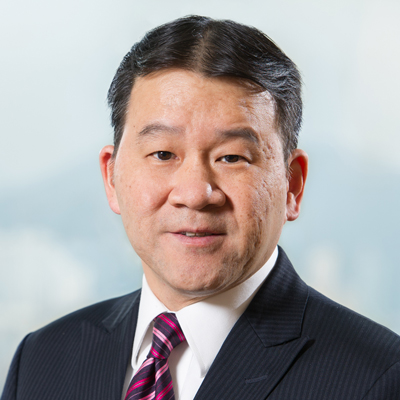
Paul Chung is an FFI Fellow with over 25 years of wealth and asset management experience serving families, family offices, and family enterprises as a trusted wealth and business advisor. He enjoys helping families build and extend their legacies across generations. A founding member and executive committee member of the FFI Asian Circle Virtual Study Group, Paul can be reached at paul.chung@jvsakk.com.

View this edition in our enhanced digital edition format with supporting visual insight and information.



